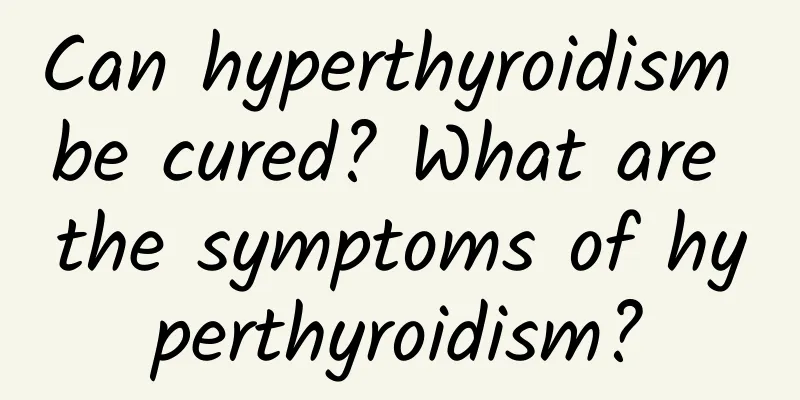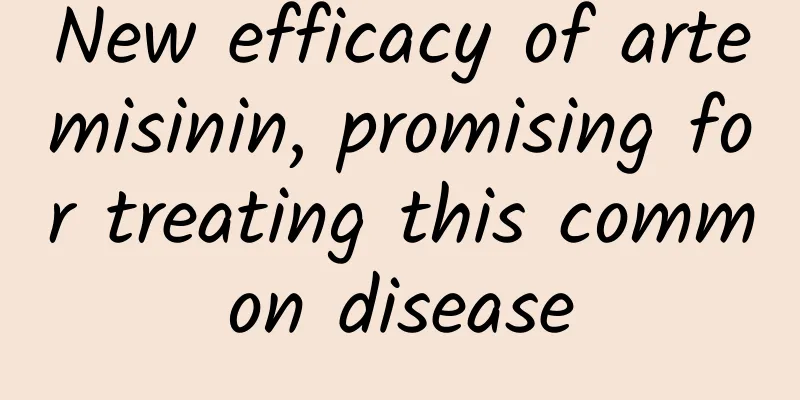Can hyperthyroidism be cured? What are the symptoms of hyperthyroidism?

|
Hyperthyroidism is an endocrine disease. People with hyperthyroidism may have a big neck. The site of hyperthyroidism is the thyroid gland, which can absorb a large amount of iodine. Some seafood and salt we eat now contain iodine. Excessive intake of iodine can also cause hyperthyroidism. Can hyperthyroidism be cured?Hyperthyroidism is curable. The treatment of hyperthyroidism is divided into two parts: general treatment and treatment for hyperthyroidism itself. General treatment refers to symptomatic treatment, including paying attention to rest, supplementing with adequate calories and nutrition, giving benzodiazepines for insomnia, and giving beta-blockers for palpitations. However, these treatments are only temporary solutions and not a cure for the disease. To cure hyperthyroidism, treatments targeting the hyperthyroidism itself are needed, including antithyroid drug (ATD) treatment, radioactive iodine treatment, and surgical treatment. Each of these methods has its own advantages and disadvantages. Drug treatment has a definite curative effect, and is convenient, economical, and non-invasive. It is suitable for patients with mild disease, mild thyroid enlargement, adolescents and children, hyperthyroidism with severe exophthalmos, and pregnant women with hyperthyroidism. However, the course of treatment is long and the recurrence rate is high. At the same time, drugs can cause adverse reactions such as liver damage, leukopenia, granulocytopenia, and severe allergies. Radioactive iodine treatment is safe, simple, low-cost, and has a high cure rate. The clinical cure rate is 85%, and the recurrence rate is less than 1%. It is suitable for adolescents and children with recurrent attacks, ATD treatment failure, refusal of surgery or contraindications to surgery, etc. However, due to radiation, it is prohibited for pregnant and lactating women. The main adverse reaction of iodine-131 treatment is permanent hypothyroidism, which generally occurs in 5-20% of patients one year after treatment, and increases year by year thereafter. Patients need to take drugs to treat hypothyroidism for life. Surgical treatment is the best choice for patients with severe thyroid enlargement and thyroid cancer, with a cure rate of about 95% and a recurrence rate of 0.6%-9.8%. It is also suitable for those with hyperthyroidism during pregnancy that is not well controlled by drugs. However, surgery may also cause permanent hypothyroidism, hypoparathyroidism, recurrent laryngeal nerve damage, etc. Is hyperthyroidism caused by iodine deficiency or too much iodine?Iodine deficiency or excessive iodine intake can cause hyperthyroidism, but hyperthyroidism is not necessarily caused by iodine deficiency or excessive iodine intake. Clinically, more than 80% of hyperthyroidism is caused by thyroid autoimmune diseases. In addition, the exact cause cannot be found in most patients, so it is very one-sided to judge the occurrence of hyperthyroidism by iodine deficiency or excessive iodine intake. Patients with thyroid diseases such as subacute thyroiditis and postpartum thyroiditis are also prone to hyperthyroidism symptoms. In addition, common causes of hyperthyroidism include lack of sleep and mental stress, so people need to be vigilant about the occurrence of hyperthyroidism. Especially now, many young people have the habit of staying up late, their living and rest time are very irregular, and their work pressure is relatively high. These reasons may become factors leading to hyperthyroidism. What are the symptoms of hyperthyroidism?Hypermetabolism symptomsSymptoms of hypermetabolism mainly include sweating, palpitations, hunger, increased bowel movements, and weight loss. These symptoms are the effects of thyroid hormones, which can promote metabolism and redox reactions. Mental excitementHyperthyroidism patients may experience irritability, excitability, emotional agitation, insomnia, anxiety, etc. due to sympathetic nervous system excitement. In addition, GRAVES patients may also experience typical symptoms of exophthalmos and enlarged neck. |
<<: How to decorate a children's room? What are the requirements for decorating a children's room?
Recommend
How many weeks is the best time to have Down syndrome
Patients with Down syndrome usually have several ...
What is the importance and significance of parent-child reading? The benefits and gains of parent-child reading
In contemporary society, various technologies occ...
How to improve the quality of ovarian follicles
Follicles are secreted from the female body. The ...
Brown on the sixth day after abortion
There are always some unexpected things happening...
There are “little tricks” for pooping, but you may not know any of them. Come in and learn them!
Defecation is something that almost everyone has ...
[Medical Q&A] What kind of damage does smoking cause to the oral cavity?
Planner: Chinese Medical Association Reviewer: Xi...
Is your heart beating fast? Come and have a look
What is panic? Palpitations are a clinical manife...
Why is Longjing called the Queen of Chinese Green Tea (because of its high quality and high value)
...
How long does it take to get menstruation after abortion and what should you pay attention to?
With the development of society, the relationship...
What is the cause of bleeding in the third month of pregnancy?
For a woman in the early stages of pregnancy, the...
What are the benefits of soaking your feet after exercise? Should you use hot or cold water to soak your feet after exercise?
I believe that friends who like sports have a dee...
What is the reason for bloody vaginal discharge after menstruation?
Irregular menstruation is a problem that many wom...
There are many small itchy bumps on the vulva
Symptoms such as small pimples on the vulva are l...
Normal breast development pictures of girls
Girls' bodies do not develop in all aspects f...
What causes uterine cysts?
The uterus is a very important part of the female...









